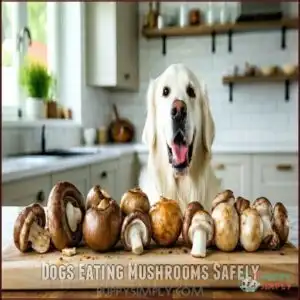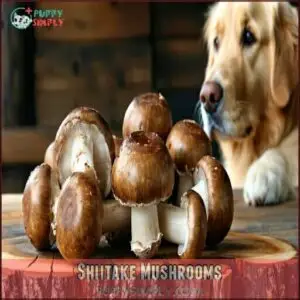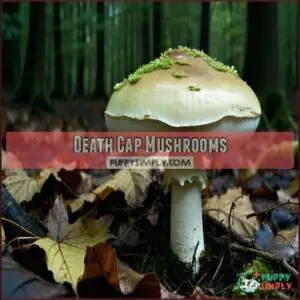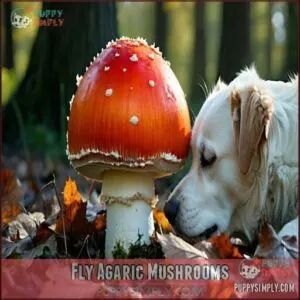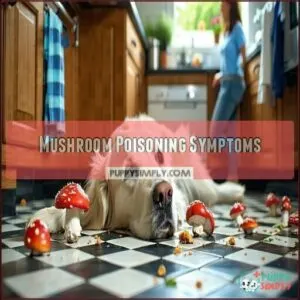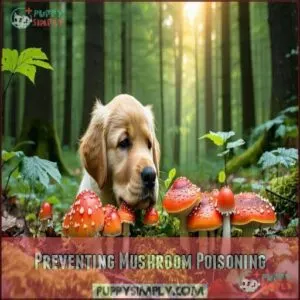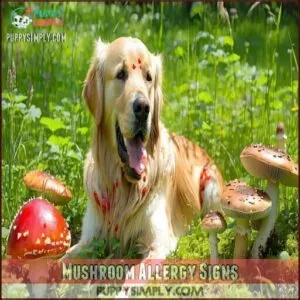This site is supported by our readers. We may earn a commission, at no cost to you, if you purchase through links.

Store-bought varieties like button, portabella, and shiitake are generally safe when cooked plain, but wild mushrooms are a whole different ballgame.
Many are toxic and can cause vomiting, diarrhea, or worse. If your dog gobbles up a mushroom outside, it’s best to contact your vet right away.
Even safe mushrooms should be given in moderation—no seasoning, butter, or garlic. Think of mushrooms as a treat, not a meal.
Want to explore the health perks or learn how to spot toxic types? Stick around for some life-saving tips and tricks.
Table Of Contents
- Key Takeaways
- Can Dogs Eat Mushrooms
- Dogs Eating Mushrooms Safely
- Mushroom Nutrition Benefits
- Safe Mushrooms for Dogs
- Toxic Mushrooms to Avoid
- Mushroom Poisoning Symptoms
- Feeding Mushrooms to Dogs
- Preventing Mushroom Poisoning
- Medicinal Mushrooms for Dogs
- Mushroom Allergy Signs
- Frequently Asked Questions (FAQs)
- Can dogs eat mushrooms raw?
- Are mushrooms good for health?
- Can puppies eat mushrooms?
- Can dogs eat store-bought mushrooms?
- Can dogs eat mushrooms before cooking?
- Can dogs eat seasoned mushrooms?
- Can my dog eat cooked mushrooms?
- How much mushroom is toxic to dog?
- What kind of mushrooms are good for dogs?
- What if my dog eats a slice of mushroom?
- Conclusion
Key Takeaways
- Stick to store-bought mushrooms like button, shiitake, or portobello, and always cook them plain without seasoning, butter, or oils.
- Never let your dog eat wild mushrooms as they can be toxic and even deadly—contact your vet immediately if ingestion occurs.
- Mushrooms can offer health benefits like vitamins and immune support, but only when served in moderation as a treat, not a meal.
- Watch for signs of mushroom poisoning, like vomiting, diarrhea, or lethargy, and act fast by seeking veterinary care.
Can Dogs Eat Mushrooms
You might wonder if sharing mushrooms with your dog is a good idea. While some types are safe and healthy, others can be highly toxic and even deadly.
Some mushrooms are a healthy treat for dogs, but others can be dangerously toxic—know the difference to keep them safe.
Safe Mushroom Varieties
Some store-bought mushrooms are safe for dogs when cooked and unseasoned.
Safe mushroom varieties include white button, cremini, portobello, shiitake, and maitake.
Stick to organic options whenever possible to avoid harmful pesticides.
These mushrooms, rich in nutritional content, provide health benefits like vitamins and fiber.
Sourcing safely guarantees they’re suitable for your dog’s diet, making them a thoughtful supplement.
Toxic Mushroom Species
You need to know about toxic mushrooms dogs should avoid.
Deadly species like Amanita phalloides (Death Cap), Fly Agaric, Jack-O-Lantern, and Deadly Galerina contain harmful amanitin toxins.
Identification difficulty makes wild mushrooms risky.
Ingesting these can lead to dog mushroom poisoning, causing vomiting, seizures, or worse. Always assume unfamiliar mushrooms are on the poisonous mushroom list dogs shouldn’t touch.
Risks and Considerations
When your dog eats mushrooms, it’s vital to understand the risks.
Raw mushroom dangers include potential toxicity and allergic reactions.
Wild mushrooms pose a big threat due to tricky identification, leading to mushroom toxicity in dogs.
Even store-bought varieties require preparation precautions. Wondering, “Are mushrooms poisonous to dogs”? Make certain they’re cooked plain, and never take chances with unknown varieties, to avoid toxicity.
Dogs Eating Mushrooms Safely
Not all mushrooms are safe for dogs, but the right approach can make them a healthy addition to their diet.
Store-bought varieties like white button, cremini, and shiitake are good choices—as long as they’re plain and cooked. Remember, dogs have different digestion than us, so keep things simple.
Here’s how to safely feed mushrooms to your dog:
- Mushroom sourcing: Always choose store-bought varieties, avoiding wild mushrooms.
- Cooking preparation: Cook them plain, without oils, garlic, or salt.
- Safe quantities: Start with small portions to monitor reactions.
- Breed sensitivities: Check with your vet, as some breeds may react differently.
- Supplement options: Powdered medicinal mushrooms can support health when used responsibly.
With proper care, mushrooms can be a thoughtful treat. However, mushroom poisoning signs require immediate veterinary attention.
Mushroom Nutrition Benefits
Mushrooms can offer valuable nutrients like vitamins, antioxidants, and fiber that support your dog’s overall health.
When prepared properly, they may even help boost your dog’s immune system and digestion.
Vitamins and Minerals
In the context of mushroom nutrition, certain varieties can boost your pup’s health.
Rich in vitamin D, selenium, and B vitamins, they’re great for immune support, brain function, and overall well-being.
These nutrients aid in vitamin absorption and mineral bioavailability, giving your dog health mushrooms a real purpose in their diet.
Always choose plain, cooked options for safety.
Antioxidants and Fiber
Ergothioneine benefits make mushrooms stand out as powerful antioxidant properties in a dog diet.
They help reduce inflammation and support cell health. As rich Beta-glucan sources, mushrooms also improve digestion aid while promoting healthy fiber types.
Puppies benefit from antioxidants that boost their immune system.
With these mushroom nutrition perks, your pup’s gut health can flourish, keeping them more comfortable and reducing risks like constipation or abdominal discomfort, which is a key aspect of overall cell health and digestion aid.
Immune System Support
Building on their antioxidant effects, mushrooms also bolster immune support through beta-glucans and polysaccharides.
These compounds activate immune cells, enhancing your dog’s ability to fight infections.
Medicinal mushrooms like reishi and turkey tail are particularly rich in these immune-modulating properties.
Plus, Vitamin D boosts and a healthier gut microbiome contribute to overall wellness, making mushrooms a powerful ally for your pup’s health.
Safe Mushrooms for Dogs
You can safely share certain store-bought mushrooms like button, portabella, shiitake, and crimini with your dog when they’re cooked and unseasoned.
These varieties are also non-toxic but can also provide some nutritional benefits when prepared properly.
Button Mushrooms
White button mushrooms, a staple among storebought mushrooms, are safe mushrooms for dogs when cooked plain.
Raw buttons can be tough to digest, so cooking buttons helps make their nutrients accessible.
These mushrooms offer fiber, vitamins, and antioxidants, supporting your dog’s health.
Always start small to check for button allergies, and if unsure, consult your vet for button alternatives or guidance.
Portabella Mushrooms
Portabella mushrooms are a safe addition to your dog’s diet when cooked plain.
They’re packed with nutrients like potassium and selenium, offering great Portabella benefits.
To guarantee safety:
- Always cook portabellas without seasoning.
- Serve small portions to avoid overfeeding.
- Avoid raw mushrooms due to digestion issues.
- Stick to store-bought mushrooms safe for dogs.
Enjoy responsibly!
Shiitake Mushrooms
Shiitake mushrooms are safe mushrooms for dogs when cooked plain and served in moderation.
Packed with nutrients, they offer immune-boosting benefits and support overall health.
Cooking Shiitake breaks down tough fibers, making them easier to digest.
Always source Shiitake from trusted stores to avoid risks. Start with small amounts to monitor reactions, ensuring these mushroom benefits for dogs fit well into your dog diet mushrooms plan.
Crimini Mushrooms
Crimini mushrooms, like shiitakes, are safe mushrooms for dogs as long as they’re cooked and plain.
Packed with nutrients, they support digestion and immunity when fed in moderation.
- Crimini benefits: Vitamin B, antioxidants, and fiber.
- Cooking criminis: Always cook to enhance digestibility.
- Crimini allergies: Start small to watch for sensitivities.
Never let your dog eat mushrooms found in the wild!
Toxic Mushrooms to Avoid
Some mushrooms are highly toxic to dogs and can cause serious health issues, even in small amounts.
It’s essential to know which types to avoid, as ingesting the wrong ones can lead to severe symptoms or even be fatal.
Death Cap Mushrooms
Death Cap mushrooms (Amanita phalloides) are among the most toxic mushrooms dogs can encounter.
Their amanitin toxins cause rapid liver failure, often with a fatal dose. Identification difficulty makes them especially dangerous.
Symptoms like vomiting or lethargy may appear late, worsening outcomes. Avoid wild mushrooms entirely to prevent mushroom toxicity in dogs.
| Symptom | Onset Time | Severity |
|---|---|---|
| Vomiting | 6-12 hours | High |
| Lethargy | 12-24 hours | Severe |
| Liver failure | 24+ hours | Life-threatening |
Fly Agaric Mushrooms
Fly Agaric mushrooms (Amanita muscaria) are highly toxic mushrooms dogs should never eat.
Known for their psychoactive effects, they can cause severe mushroom poisoning symptoms in dogs, like vomiting, diarrhea, and tremors.
These toxic mushrooms are recognizable by their red caps with white spots, but identification guides aren’t foolproof.
If ingestion occurs, immediate treatment methods are critical to prevent mushroom toxicity in dogs.
Mushroom Poisoning Symptoms
If your dog eats a toxic mushroom, symptoms can range from mild stomach upset to severe organ damage.
Toxic mushrooms can cause anything from upset stomachs to life-threatening organ damage—act fast if your dog shows symptoms.
Recognizing signs like vomiting, diarrhea, or lethargy early is essential for getting them the help they need.
Vomiting and Diarrhea
Vomiting and diarrhea are common mushroom poisoning symptoms in dogs, often signaling gastrointestinal upset.
These symptoms can lead to dehydration risks and electrolyte imbalance if untreated.
Prompt veterinary intervention is essential to address gastrointestinal issues effectively, and dietary management and medication options may help stabilize your dog.
But always act quickly to prevent complications from mushroom poisoning symptoms dogs may experience.
Lethargy and Weakness
Lethargy and muscle weakness are common mushroom poisoning symptoms in dogs.
If your dog ate a wild mushroom, watch for these signs, as they could indicate toxic mushrooms. Severity depends on the type ingested, and progression may lead to more serious issues.
- Frequent urination or excessive thirst may occur.
- Weakness can escalate to a coma-like state.
- Diagnosis requires immediate veterinary attention.
- Treatment varies based on toxicity level.
Abdominal Pain
Abdominal pain in dogs, a common sign of mushroom poisoning, often comes with vomiting, diarrhea, and noticeable bloating.
Pain intensity varies, but signs like restlessness or whining might indicate gastrointestinal discomfort.
Dietary causes, like ingesting toxic mushrooms, can trigger this, and it is crucial to pay attention to pain location and chronic pain behaviors, as untreated mushroom toxicity symptoms may worsen quickly, requiring immediate veterinary care.
Seizures and Tremors
Seizures and tremors are alarming mushroom poisoning symptoms in dogs, often linked to toxic mushrooms. They can signal neurological damage and require immediate actions.
Watch for:
- Shaking or twitching muscles.
- Loss of coordination.
- Confusion or disorientation.
- Sudden, uncontrollable seizures.
- Tremors worsening over time.
Seek emergency veterinary care to prevent long-term effects and guarantee proper toxin identification, which is crucial for addressing neurological damage.
Feeding Mushrooms to Dogs
Feeding mushrooms to your dog can be safe and even beneficial when done correctly.
It’s important to stick to cooked, plain varieties in moderation while avoiding wild or seasoned mushrooms altogether.
Cooking Methods
When cooking mushrooms for dogs, stick to plain preparation styles.
Wash them thoroughly, slice into small pieces, and cook at safe temperatures to soften and release nutrients.
Avoid seasoning concerns by skipping salt, garlic, or butter, and use a dogsafe cooking oil like olive oil sparingly.
Mushrooms can also be boiled or blended into a smooth mushroom puree for easy digestion.
Serving Sizes
How much is too much in the context of mushrooms in a dog’s diet?
Portion control is key. Serving sizes depend on dog size and breed variation.
Follow these mushroom feeding guidelines:
- Small dogs: 1-2 small pieces.
- Medium dogs: 3-4 pieces.
- Large dogs: 5-6 pieces.
- Puppies: Tiny servings only.
Always prioritize daily limits and moderation.
Adding to Dog Food
Adding mushrooms to your dog’s food can be a healthy treat if done right.
Stick to the safe mushroom list for dogs, like button or shiitake, and prepare them plain—no oils, butter, or seasonings.
Chop them small for easy mixing into meals.
Portion control is key; mushrooms should complement a balanced canine diet, not dominate it.
Some supplements even include beneficial beta-glucans to boost immunity.
Mushroom Treats
Mushroom treats can be a fun addition to your dog’s snack routine if prepared safely.
Stick to simple, dog-safe foods and follow these tips:
- Use homemade recipes with cooked, plain mushrooms.
- Prioritize portion control to avoid overfeeding.
- Make certain treats offer nutritional value without harmful ingredients.
- Consider mushroom supplements for dogs as allergy alternatives.
Always monitor for reactions when introducing new dog snacks. You can also find pre-made options online to ensure a variety of choices, and remember to introduce them with care.
Preventing Mushroom Poisoning
You can protect your dog from mushroom poisoning by staying alert during walks and keeping your yard free of wild fungi.
Learning to identify harmful mushrooms and training your dog to avoid eating unknown items are essential steps for their safety, which includes staying alert to prevent mushroom poisoning.
Supervising Dogs
Keeping your dog safe starts with leash training and yard monitoring.
Mushrooms can pop up unexpectedly, especially after rain, so inspect your yard regularly.
During walks, supervision is key to foraging prevention—puppies are especially curious.
Teach commands like "leave it" to stop your dog from nibbling on unknown plants.
These steps help prevent mushroom poisoning and guarantee pet safety.
Mushroom Identification
Identifying mushrooms is tricky, especially with toxic mushrooms dogs might encounter.
Poisonous and safe mushrooms often grow side by side, making dog mushroom identification essential. Use expert resources or mushroom guides for accuracy.
- Mushroom Look-alikes: Many toxic species mimic edible ones.
- Spore Prints: A useful tool for identification.
- Habitat Clues: Note where mushrooms grow to assess risk.
Yard Inspection
Regular yard inspections are key to keeping your dog safe. Mushrooms thrive in shaded, damp spots, especially after rain.
Identify mushrooms, remove them promptly, and dispose of them securely. Consider pet-safe fungicides to prevent growth. If you’re unsure about a mushroom, seek professional help.
Remember, backyard mushrooms can be toxic mushrooms for dogs. Many owners also prioritize regular dog yard maintenance to minimize risks.
| Task | Action | Benefit |
|---|---|---|
| Inspect regularly | Check after rain | Prevent toxic exposure |
| Identify mushrooms | Use field guides | Avoid risky species |
| Remove mushrooms | Dispose securely | Eliminate poisoning risks |
| Prevent growth | Use pet-safe fungicides | Reduce mushroom recurrence |
| Seek help | Consult a professional | Confirm accurate safety info |
Training Dogs
After clearing your yard of mushrooms, focus on teaching your dog to avoid them.
Use positive reinforcement and obedience commands like "leave it." Practice leash manners during walks to steer them away from risky spots.
Reward good behavior with dog treats or praise. Trick training and socialization skills also help reinforce focus, keeping your dog safe and engaged.
Medicinal Mushrooms for Dogs
Medicinal mushrooms like reishi, chaga, turkey tail, and lion’s mane can offer potential health benefits for dogs when used properly.
These mushrooms are often used to support immune health, but you should always consult your vet before adding them to your dog’s diet, ensuring the proper use of these supplements.
Reishi Mushrooms
Reishi mushrooms, often called the "mushrooms of immortality," are prized for their health benefits in dogs.
They boost immunity, fight inflammation, and may even help with tumors.
Reishi supplements are available in powders or dog treats, but dosage guidelines matter—too much can cause side effects like increased bleeding risks.
Always source high-quality, mushrooms safe for dogs, and consult your vet first. Many owners buy reishi products for dogs for their potential to support immunity.
Chaga Mushrooms
Chaga mushrooms, while less studied for dogs, show promise with immune support and overall health benefits.
Packed with nutrients, they’re often included in mushroom blends.
However, their high copper content means caution is needed, especially for dogs with copper toxicosis.
Always consult your vet for Chaga dosage and side-effects, and sourcing Chaga from trusted suppliers guarantees safety and quality for your pup.
Turkey Tail Mushrooms
Turkey tail mushrooms offer impressive health benefits for dogs, especially for immune support.
Packed with polysaccharides and beta-glucans, they’re often used in holistic care.
Here’s why they’re popular:
- Boosts immunity: Helps strengthen your dog’s defenses.
- Supports digestion: May improve gut health.
- Cancer research: Studies suggest potential benefits for treatment.
Always consult your vet for dosage and supplement forms.
Lion’s Mane Mushrooms
Lion’s mane mushrooms are prized for their potential cognitive benefits and nerve growth support in dogs.
They may also promote gut health, making them a unique addition to mushroom supplements.
However, dosage guidance is essential, as overuse can pose risks.
Always source quality mushrooms and consult your vet before adding lion’s mane to your dog’s diet mushrooms for safe health benefits.
Mushroom Allergy Signs
If your dog is allergic to mushrooms, you might notice signs like itchy skin, stomach upset, or trouble breathing.
Recognizing these symptoms early can help you take quick action to keep your pet safe.
Skin Reactions
If your dog shows signs like itchiness, hives, redness, swelling, or even hair loss after eating mushrooms, it could be an allergic reaction.
These symptoms happen when histamines are released in response to allergens.
Watch closely for these changes and consult your vet about dog allergy tests. Quick action and itching relief can help keep your pup comfortable and healthy.
Digestive Issues
Raw mushrooms can upset sensitive stomachs due to chitin digestion challenges, leading to gastrointestinal discomfort like vomiting or diarrhea.
Dogs may experience abdominal discomfort if toxins aren’t properly absorbed. Cooked mushrooms are easier on gut health, but moderation is key.
If your dog shows digestive issues after eating mushrooms, consult a vet to guarantee their tummy stays happy and healthy. These symptoms can also indicate potential food allergies.
Respiratory Problems
If a dog inhales or consumes toxic mushrooms, respiratory problems like nasal congestion, coughing, or breathing difficulty can occur.
Lung inflammation or bronchial inflammation may develop, affecting pulmonary health.
Fungal infections from certain mushrooms might worsen these symptoms.
Watch for signs like wheezing or labored breathing, as these could indicate serious pulmonary disorders requiring immediate veterinary care.
Treatment Options
If your dog shows mushroom allergy signs, quick action matters.
Treating mushroom poisoning in dogs starts with veterinary treatment.
Here’s what vets might do:
- Induce Vomiting: If ingestion is recent, this clears toxins.
- Activated Charcoal: Helps block absorption of harmful substances.
- Supportive Care: Includes rehydration therapy and monitoring for severe symptoms like seizures or liver damage.
Frequently Asked Questions (FAQs)
Can dogs eat mushrooms raw?
Feeding raw mushrooms to dogs isn’t recommended.
Raw varieties can be hard to digest and may contain harmful compounds like monomethyl hydrazine.
Always cook mushrooms plain to guarantee they’re safe and easier for your dog to enjoy.
Are mushrooms good for health?
Think of mushrooms as nature’s multivitamin.
Packed with vitamins B and D, antioxidants, and immune-boosting beta-glucans, they support overall health.
But remember, moderation and proper preparation are key to accessing their benefits safely.
Can puppies eat mushrooms?
Puppies can eat certain store-bought mushrooms like white button or shiitake if cooked plain and unseasoned.
Start with tiny amounts, though, and always check with your vet to confirm it’s safe for your pup.
Can dogs eat store-bought mushrooms?
Store-bought mushrooms, like white button or cremini, are safe for dogs if cooked plain and served in moderation.
Skip the seasoning, butter, or oils—dogs don’t need a gourmet meal, just simple and safe!
Can dogs eat mushrooms before cooking?
Raw mushrooms aren’t ideal for dogs.
They’re tough to digest and may contain harmful compounds.
Always cook them plain and unseasoned to make them safer and more nutritious.
Stick to store-bought varieties for peace of mind.
Can dogs eat seasoned mushrooms?
Seasoned mushrooms aren’t safe for dogs.
Spices, oils, garlic, and salt can harm their health, causing digestive upset or toxicity.
Stick to plain, cooked mushrooms in small amounts to keep your furry friend happy and healthy.
Can my dog eat cooked mushrooms?
Yes, your dog can eat cooked mushrooms, but stick to plain, store-bought varieties like white button or shiitake.
Avoid seasoning, butter, or oils.
Always cook them to enhance digestibility and monitor for any reactions, as this is crucial for your dog’s health, especially when introducing new foods.
How much mushroom is toxic to dog?
Tiny tastes can be trouble!
Even a small piece of a toxic mushroom, like a Death Cap, can harm your dog.
Always supervise outdoor adventures and consult your vet immediately if ingestion happens.
What kind of mushrooms are good for dogs?
Cooked, plain mushrooms like white button, cremini, portobello, and shiitake are safe for dogs.
Medicial varieties like maitake and reishi can also provide health benefits.
Always avoid seasonings, oils, or wild mushrooms for safety.
What if my dog eats a slice of mushroom?
Better safe than sorry—if your dog eats a slice of mushroom, check if it’s store-bought and plain.
Wild or seasoned mushrooms can be toxic.
Monitor for symptoms like vomiting and contact your vet immediately.
Conclusion
It’s ironic how something as harmless-looking as a mushroom can pose such risks to your dog.
While store-bought varieties like button or shiitake are safe in moderation, wild mushrooms are a gamble you don’t want to take.
Always cook mushrooms plain, avoid seasoning, and treat them as an occasional snack, not a meal.
If your dog eats a wild mushroom, call your vet immediately. Knowing the risks guarantees your dog stays safe and healthy.

